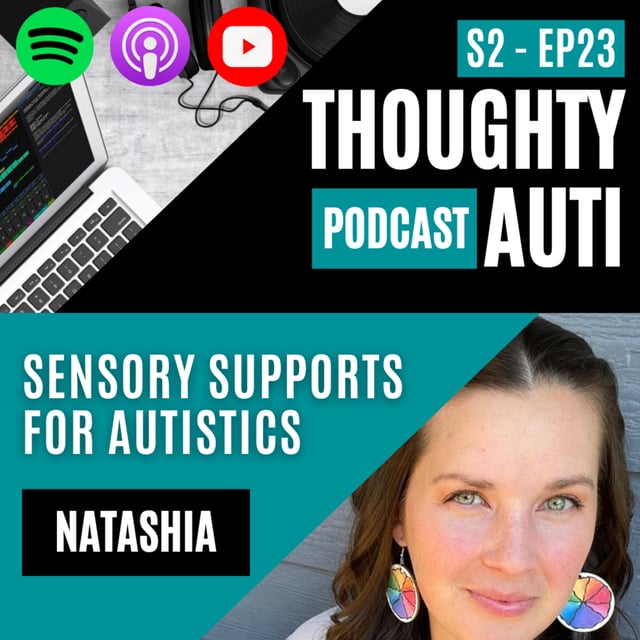

What home sensory adjustments work for Autistic adults and children? What is Neurodiversity-Affirming parenting? What sensory supports can you use at work or school?
Natashia runs the @iwanttotellyoubooks Instagram account, a take on Autism parenting that focuses on Neurodiversity-affirming, Autistic expert informed parenting. Natashia works on encouraging sensory adjustments in school and at home, highlighting the importance of teaching self-advocacy, a strength-based social model of disability approach, and teaching self-regulation.
Natashia's Insta - https://www.instagram.com/iwanttotellyoubooks/ // My Links - https://linktr.ee/thomashenleyUK
Dbud Noise Cancelling Adjustable Ear Buds - https://dbud.io/thomashenley
Thomas kicks off the episode by thanking his listeners for making the podcast the World's #1 Autism podcast, and a show in the top 2% of all podcasts!
Natashia and Thomas soon get into the differences between her style of content vs some of the overly-personal content from other Autism parents, highlighting the importance of humility and an open mind when entering into the Autistic adult communities online. Natashia sadly conformed to the 'expert advice' from professionals and OTs, seeing negative consequences in her own son... and seeking to shift the perspectives of other Autism parents going through the same experiences.
They start off by addressing the importance of sensory supports and environmental adjustments in home, work, and school environments; the conversation seemed to highlight the importance of sensory adjustments on well-being and productivity for Autistic adults and children. Experts and teachers seem to be highly adverse to accepting sensory accommodations, often touting 'no adjustments in the real world' as a reason not to accommodate... which we all know is entirely possible in adult life.
Everyone has sensory needs, neurotypical or Autistic, and although sensory differences are highly linked to Autism, Sensory Processing Disorder (SPD) can occur in allistic (non-autistic) individuals. The two list a variety of environmental adjustments anyone can use in the home to make their space less overloading, but also highlight a plethora of sensory support items that both Autistic adults and children can use to mitigate uncontrollable sensory inputs in public:
Therapressure brushes, galaxy projectors, fibre optic lights, water features, chewable jewelry, shades, blue light glasses, earbuds/defenders, acupressure rings, compression clothing, joggers/trainers, soft hoodies/hats, weighted blankets, vibrating massagers, soft blankets, fidget spinners, fidget cubes, fans, white noise machines, wobble cushions, lotions, disco lights, colour changing bulbs, and sensory swings... to name a few!
Thomas talks about his experiences with sensory joy with theme park rides, stimming equipment, and spinning... pointing out the euphoria and relaxation this offers him as an Autistic adult. No episode would conclude without highlighting some adjustments that public spaces and workplaces can make spaces more inclusive to those with sensory differences -

What home sensory adjustments work for Autistic adults and children? What is Neurodiversity-Affirming parenting? What sensory supports can you use at work or school?
Natashia runs the @iwanttotellyoubooks Instagram account, a take on Autism parenting that focuses on Neurodiversity-affirming, Autistic expert informed parenting. Natashia works on encouraging sensory adjustments in school and at home, highlighting the importance of teaching self-advocacy, a strength-based social model of disability approach, and teaching self-regulation.
Natashia's Insta - https://www.instagram.com/iwanttotellyoubooks/ // My Links - https://linktr.ee/thomashenleyUK
Dbud Noise Cancelling Adjustable Ear Buds - https://dbud.io/thomashenley
Thomas kicks off the episode by thanking his listeners for making the podcast the World's #1 Autism podcast, and a show in the top 2% of all podcasts!
Natashia and Thomas soon get into the differences between her style of content vs some of the overly-personal content from other Autism parents, highlighting the importance of humility and an open mind when entering into the Autistic adult communities online. Natashia sadly conformed to the 'expert advice' from professionals and OTs, seeing negative consequences in her own son... and seeking to shift the perspectives of other Autism parents going through the same experiences.
They start off by addressing the importance of sensory supports and environmental adjustments in home, work, and school environments; the conversation seemed to highlight the importance of sensory adjustments on well-being and productivity for Autistic adults and children. Experts and teachers seem to be highly adverse to accepting sensory accommodations, often touting 'no adjustments in the real world' as a reason not to accommodate... which we all know is entirely possible in adult life.
Everyone has sensory needs, neurotypical or Autistic, and although sensory differences are highly linked to Autism, Sensory Processing Disorder (SPD) can occur in allistic (non-autistic) individuals. The two list a variety of environmental adjustments anyone can use in the home to make their space less overloading, but also highlight a plethora of sensory support items that both Autistic adults and children can use to mitigate uncontrollable sensory inputs in public:
Therapressure brushes, galaxy projectors, fibre optic lights, water features, chewable jewelry, shades, blue light glasses, earbuds/defenders, acupressure rings, compression clothing, joggers/trainers, soft hoodies/hats, weighted blankets, vibrating massagers, soft blankets, fidget spinners, fidget cubes, fans, white noise machines, wobble cushions, lotions, disco lights, colour changing bulbs, and sensory swings... to name a few!
Thomas talks about his experiences with sensory joy with theme park rides, stimming equipment, and spinning... pointing out the euphoria and relaxation this offers him as an Autistic adult. No episode would conclude without highlighting some adjustments that public spaces and workplaces can make spaces more inclusive to those with sensory differences -




















